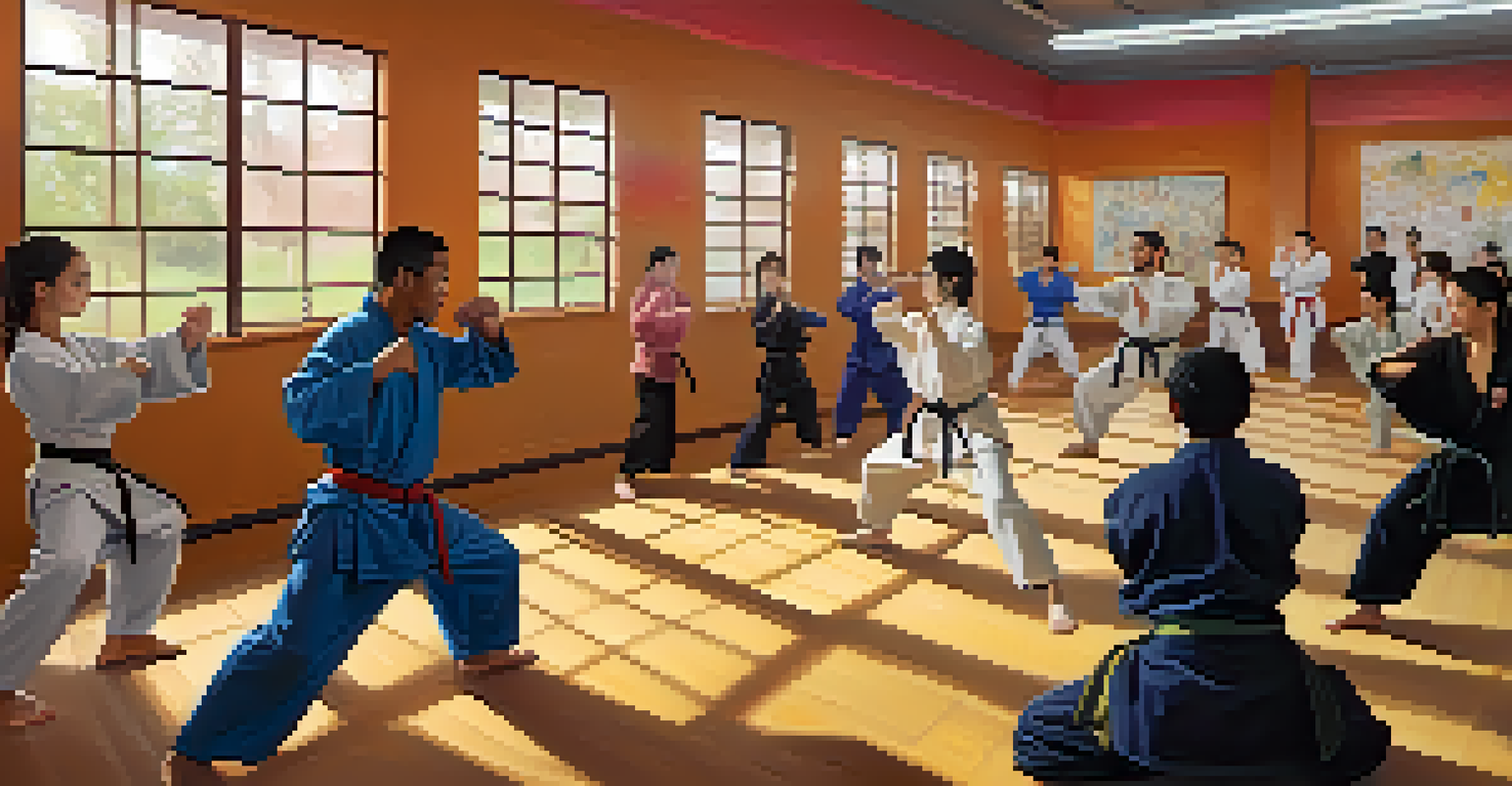The Connection Between Martial Arts and Mindfulness Practices

Introduction to Martial Arts and Mindfulness
Martial arts and mindfulness may seem worlds apart at first glance, but they share a deeper connection rooted in mental discipline and focus. Both practices emphasize awareness, whether it's being present in the moment during a sparring match or centering oneself during meditation. By exploring this bond, we can uncover how martial arts can serve as a powerful tool for cultivating mindfulness in everyday life.
The mind is everything. What you think you become.
At their core, martial arts teach practitioners to listen to their bodies, control their movements, and react with intention. This level of awareness mirrors the principles of mindfulness, which stress the importance of being fully engaged in the present. Together, these practices create a strong foundation for emotional resilience and mental clarity.
As we delve into the relationship between martial arts and mindfulness, we will see the unique benefits that arise from integrating these practices. From enhanced concentration to reduced stress, the journey promises to be enlightening for both martial artists and mindfulness enthusiasts alike.
The Role of Breath in Both Practices
Breath is a vital component in both martial arts and mindfulness practices. In martial arts, controlled breathing helps practitioners maintain stamina and focus, while also aiding in the delivery of powerful strikes. Mindfulness, on the other hand, often revolves around breath awareness, using it as an anchor to keep one's thoughts grounded in the present moment.

The act of focusing on breath in martial arts is akin to meditation; it fosters a deep connection between body and mind. For instance, practitioners might engage in breathing exercises to calm their nerves before a fight, mirroring the calming techniques found in mindfulness meditation. This interplay highlights how both disciplines can complement one another.
Mindfulness Enhances Martial Arts
The integration of mindfulness practices into martial arts training fosters greater awareness, focus, and emotional resilience.
By integrating breath control from martial arts into mindfulness practices, individuals can experience greater calm and clarity. This synergy not only enhances physical performance but also nurtures mental stability, leading to a well-rounded approach to personal growth.
Mindfulness and Movement: A Harmonious Dance
Movement in martial arts is deliberate and purposeful, mirroring the fluidity of mindfulness practices. When practicing forms or kata, martial artists cultivate a heightened awareness of their movements, which encourages a deeper connection with their bodies. This same principle applies in mindfulness, where each movement during yoga or tai chi is intentional and reflective.
In the midst of movement and chaos, keep stillness inside of you.
The synchronization of breath and movement in both practices fosters a sense of flow and presence. For example, when performing a roundhouse kick, a martial artist must be fully aware of their body’s position and energy, just as a yogi must be conscious of their alignment during a pose. This shared focus enhances both physical and mental well-being.
Ultimately, the harmonious dance between mindfulness and movement can lead to greater clarity and peace. Practitioners who embrace this connection often find themselves more centered, both on and off the mat, reinforcing the idea that mindfulness can be woven into every aspect of life.
Cultivating Discipline Through Martial Arts
Discipline is a cornerstone of martial arts training, requiring dedication and commitment to mastery. This discipline extends beyond physical prowess; it also nurtures mental resilience and focus. Practicing martial arts can instill a sense of responsibility and self-control, qualities that are essential in mindfulness practices.
As martial artists progress through various ranks, they learn to set goals, stay motivated, and overcome challenges. This journey mirrors the mindset needed for successful mindfulness practice, where individuals must remain patient and persistent despite distractions or setbacks. The cultivation of discipline in martial arts can enhance one's ability to practice mindfulness effectively.
Breath Control for Clarity
Focusing on breath in both martial arts and mindfulness promotes a connection between body and mind, enhancing overall performance and mental stability.
By embracing the discipline learned in martial arts, individuals can develop a routine that fosters mindfulness. Whether it’s setting aside time for meditation or practicing gratitude, the lessons from martial arts can be applied to create a more mindful lifestyle.
Stress Relief Through Physical Expression
Both martial arts and mindfulness practices offer effective means for stress relief. Engaging in physical activity through martial arts allows individuals to channel their energy and frustrations into constructive movements. This physical expression can provide an immediate sense of relief, akin to a release valve for pent-up emotions.
On the flip side, mindfulness techniques encourage individuals to process their thoughts and emotions in a more reflective manner. While martial arts provides an outlet for physical stress, mindfulness helps to address emotional and mental stressors, creating a balanced approach to well-being. Together, they form a powerful duo for managing stress.
Incorporating both practices into one’s routine can lead to a more holistic approach to stress management. Whether it’s through the vigorous practice of martial arts or the calming nature of mindfulness, individuals can find a personalized path to relaxation and emotional balance.
Building Community and Connection
Both martial arts and mindfulness practices often foster a sense of community and belonging. Whether in a dojo or a meditation group, individuals come together to support one another on their journeys. This communal aspect can enhance the experience, as participants share their challenges and triumphs, creating bonds that can last a lifetime.
In martial arts, the camaraderie among practitioners is evident during training and competitions. This shared experience helps to build trust and respect, mirroring the supportive nature found in mindfulness circles where participants encourage each other to deepen their practice. Together, they create an environment that nurtures growth and connection.
Community Supports Growth
Both martial arts and mindfulness practices build a sense of community that encourages mutual support, fostering personal growth and commitment.
Having a community to rely on can make the journey toward mindfulness and martial arts more fulfilling. The encouragement and accountability from fellow practitioners can motivate individuals to stay committed and explore new depths of understanding in both disciplines.
Conclusion: Embracing the Synergy
The connection between martial arts and mindfulness practices is rich and multifaceted. By embracing both disciplines, practitioners can enhance their physical abilities while nurturing their mental and emotional well-being. The synergy between these practices offers a comprehensive approach to personal growth and self-discovery.
As we’ve explored, the principles of awareness, discipline, and community are woven throughout both martial arts and mindfulness. Practitioners can draw from the strengths of each to create a more balanced and fulfilling life. Whether you’re throwing punches or meditating in silence, the essence of both practices encourages a deeper understanding of oneself.

Ultimately, the journey of integrating martial arts and mindfulness is a personal one, filled with opportunities for growth and transformation. By exploring this connection, individuals can unlock new levels of clarity, focus, and resilience that enhance every aspect of their lives.